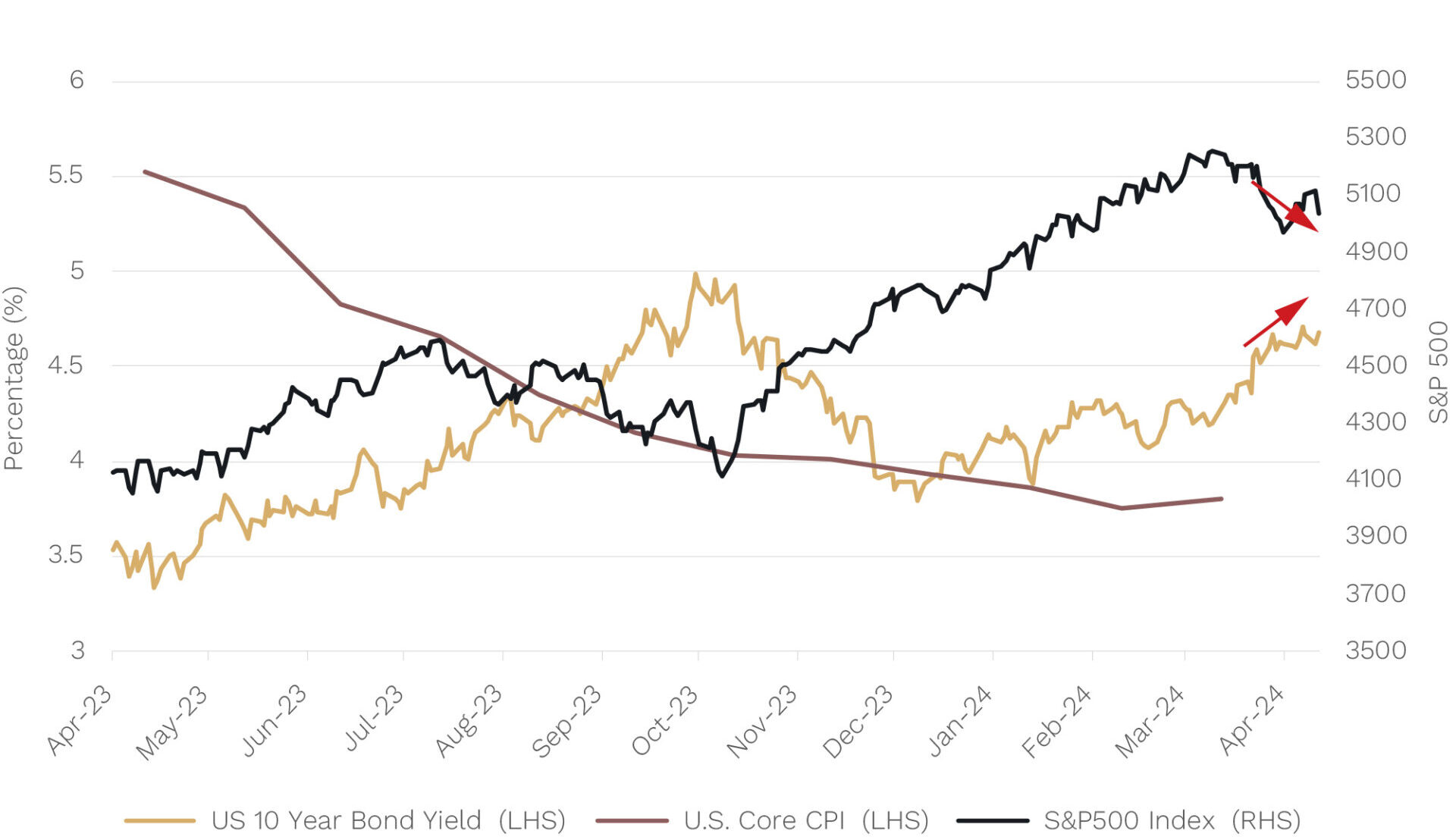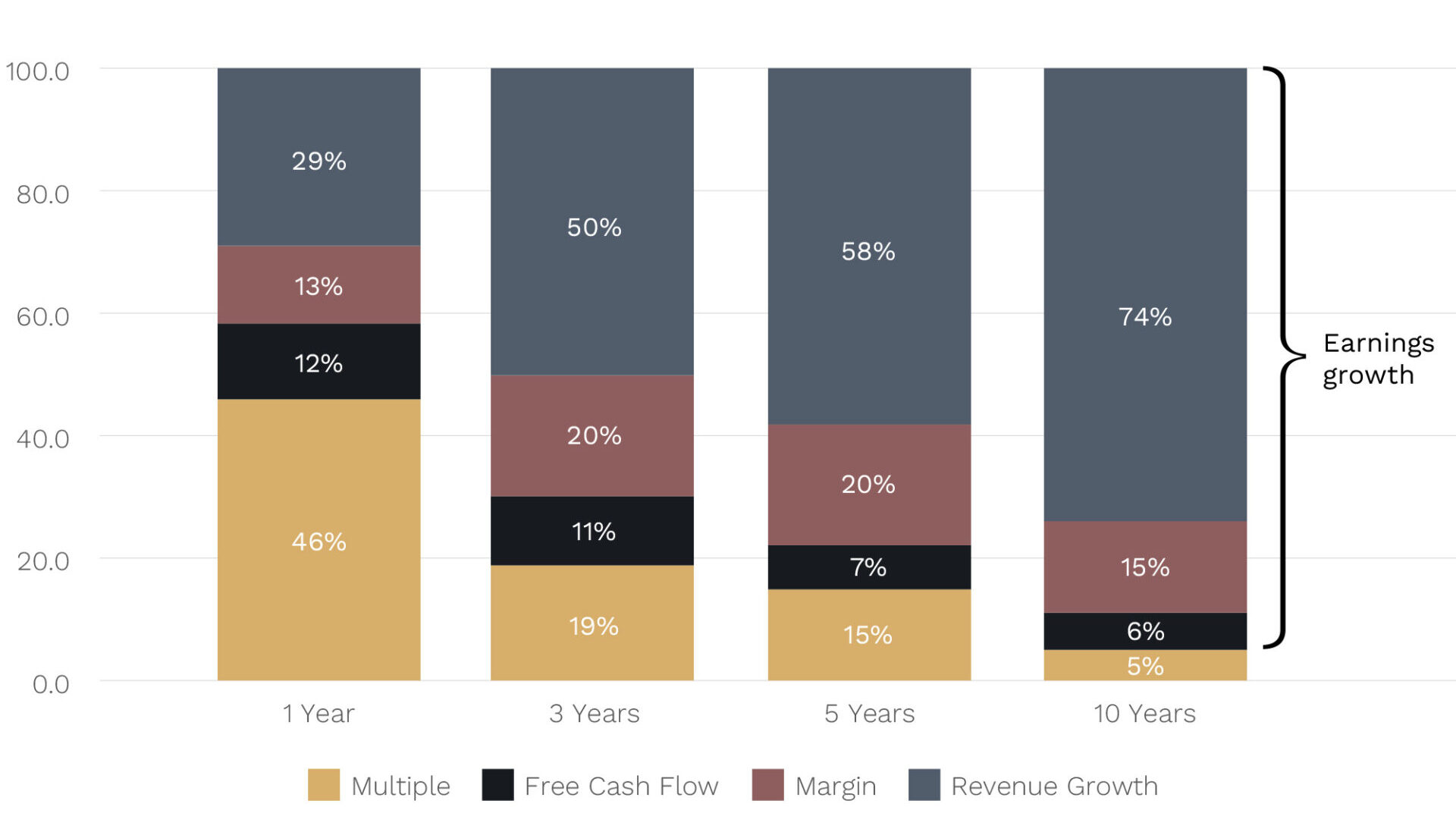By Andrew Mitchell & Steven Ng
Co-founders and Senior Portfolio Managers
In this month’s Letter to Investors we take a step back and examine a vital principle: the importance of focusing on ‘process’ and not ‘outcomes’. We look at how this principle applies to the investment process that has successfully guided us as professional investors for around two decades each; but also explore how it applies to individual stock holdings including our recent painful example of Australian software company, Altium.
Welcome to the April Ophir Letter to Investors – thank you for investing alongside us for the long term.
Trust the Process
After five consecutive months of big gains it was bound to end. Global share markets finally fell in April, the first monthly pull back since October last year.
Why?
Unfortunately, the market can’t tell you. Sometimes it happens for no good reason at all. But everyone loves a narrative, so here goes…
Evidence has been building the last few months that inflation in the US isn’t coming down as quickly as the US Federal Reserve or economists in general would have hoped or forecast. This has seen annual core CPI (Consumer Price Inflation) in the US show signs of bottoming out somewhere north of the Fed’s 2% inflation target (red line below).
As a result, US interest rates, both of the short and long-term variety (see yellow line below for key long-term US 10-year government bond rate) moved higher. Back in the third quarter of 2023, when the US 10-year bond rate started moving through 4.5%, share market weakness set in and that is what looks to have occurred in April just gone (black line). The share market can deal with higher interest rates to a point, then they start to impact valuations.
Stickier inflation/High bond yields weigh on U.S. share market in April

Source: Bloomberg. Data to 30 April 2024
Pull backs in share markets are healthy and are to be expected. If they moved up in a straight line, they would cease to be risky and you wouldn’t get superior long-term returns relative to other asset classes.
For now, this dance is likely to continue. On the one hand, still-reasonable earnings growth globally is seeking to push share markets higher. While on the other, the vicissitudes of inflation data and their flow-on effects to interest rates are providing temporary headwinds (in the case of April) or tailwinds to company valuations and ultimately share markets as a whole.
In this month’s Letter to Investors, though, we’d like to step back and examine a vital principle: the importance of focusing on ‘process’ and not ‘outcomes’.
We look at how this principle applies to the investment process that has successfully guided us as professional investors for around two decades each; but also explore how it applies to individual stock holdings … including the painful example of Australian software company, Altium.
You don’t always get the outcome you want in the short term. The good news, however, is that our long-held investment process is currently bearing fruit for our Global Funds during the current reporting season.
April 2024 Ophir Fund Performance
Before we jump into the letter in more detail, we have included below a summary of the performance of the Ophir Funds during April. Please click on the factsheets if you would like a more detailed summary of the performance of the relevant fund.
The Ophir Opportunities Fund returned -1.2% net of fees in April, outperforming its benchmark which returned -3.1%, and has delivered investors +21.6% p.a. post fees since inception (August 2012).
Download Ophir Opportunities Fund Factsheet
The Ophir High Conviction Fund (ASX:OPH) investment portfolio returned -3.3% net of fees in April, underperforming its benchmark which returned -2.6%, and has delivered investors +12.9% p.a. post fees since inception (August 2015). ASX:OPH provided a total return of -4.8% for the month.
Download Ophir High Conviction Fund Factsheet
The Ophir Global Opportunities returned -2.1% net of fees in April, outperforming its benchmark which returned -4.3%, and has delivered investors +14.1% p.a. post fees since inception (October 2018).
Download Ophir Global Opportunities Fund Factsheet
The risk of ‘resulting’
It’s 2014 at the end of Super Bowl XLIX with 26 seconds left. The Seattle Seahawks were down by four points against the New England Patriots.
The Seahawks were on the Patriot’s one-yard line just outside the end zone and it was only the second down[1]. It was a golden opportunity for the Seahawks to snatch a victory.
Seahawks coach Pete Carroll called a timeout and told his quarterback to pass the ball instead of making a running play.
The quarterback passed. But the Patriots intercepted the ball, and the Seahawks lost a game that they looked like they were about to win.
Coach Carroll was crucified by fans for the passing decision. Many see it as the worst call in Super Bowl history, perhaps all of NFL history!
But was it a bad decision?
Former World Series of Poker Champion and cognitive behaviour expert, Annie Duke, thinks not.
In her book ‘Thinking in Bets: Making Smarter Decisions When You Don’t Have All the Facts’, Duke highlights that, based on 15 years of NFL data, the probability of a short pass interception is below 2%.
The Seahawks were much more likely to score a touchdown, or make an incomplete pass that would have barely used any clock time (and doesn’t count as a down).
If a touchdown results, you’re a genius who won the game doing what the opposition didn’t expect you to do. While an unsuccessful running play loses precious time off the clock and only allows time for one more play.
Just because the low probability event happened (an interception), it doesn’t make it a bad decision by the coach.
Duke sums it up nicely:
“What makes a decision great is not that it has a great outcome. A great decision is the result of a good process, and that process must include an attempt to accurately represent our own state of knowledge.”
The takeaway: in games where there is chance, and the probabilities aren’t certain (i.e. 100%), you can’t judge a decision by a result.
So-called ‘resulting’ is what poker players call the tendency to judge a decision based on its outcome rather than its quality. Investors need to avoid ‘resulting’ at all costs.
Two decades of trusting our process
At Ophir, we are highly focused on the ‘process’ principle at the portfolio level.
As long-time readers will know, we (Andrew and Steven) started out as Australian small-cap investors around 15-20 years ago. Then, as our most successful ‘Aussie’ investments increasingly became global as they expanded overseas, we launched into global small caps some six years ago.
Through that time, the ideal company in which we invest has not changed. It is typically AUD$500 million to $10 billion in market cap, growing revenue and profits above the market (so generally 10%+ per annum), taking market share, and growing into a big end market wherever that is in the world.
We strongly believe, and the evidence backs it up, that earnings drive company share prices in the long term. You can see this in the chart below where revenue growth, changes in margins and free cash flow all add up to earnings growth, which dominates as the driver of share market returns over time. And providing you don’t overpay for that above-average earnings growth, you give yourself a great chance of generating attractive investment returns and beating the market averages.
Key drivers stock performance – S&P 500 (1990-2009)

Source: Morgan Stanley Research
We also believe that one of the best indicators of above-average earnings growth over the longer term is strong earnings growth today that is beating market expectations.
If you were a fly on the wall in our investment team meetings, you would hear us focussed on how confident we are that our portfolio companies are likely to beat the market’s expectations for revenue and profit growth at their next result.
This, however, doesn’t guarantee you good investment returns in your portfolio in the short term. Changes in valuations multiples (yellow bar above), both at a stock and portfolio level, can swamp the fundamentals of revenue and earnings growth.
This was particularly the case in late 2021 to mid-2022 in our funds, and in particular our Global Funds, where despite still overwhelmingly getting the earnings right, valuation multiples decreased to a degree not seen since the GFC for the entire cohort of small-cap growth-orientated businesses globally, which is of course the pond that we fish in.
(As we discuss below, that’s beginning to change.)
Why we’re happy with this process … despite
But at Ophir, we are also focussed on the ‘process’ principle for individual holdings, as the example of Altium shows.
Altium (ALU) is an Australian stock we held last year in the Ophir High Conviction Fund (ASX:OPH). It makes the most widely used software for the design and manufacturing of printed circuit boards.
But towards the end of 2023, one of our analysts warned us there was going to be an earnings hole at the first half 2024 result due in February 2024.
If we are highly confident an earnings miss is looming at an upcoming result, we will either down-weight the position or sell to zero. In this case the instruction was clear: get out entirely!
Just weeks later, in mid-February, Japanese chipmaker Renesas Electronics lobbed a takeover bid for Altium at $68.50 – a circa 34% premium to the closing price of the company’s shares the day before, valuing the business at A$9.1bn in an all-cash deal.
Our analyst was livid and there was definitely a few swear words in the office! We had lost the chance at significant outperformance by selling the stock early.
Were we (Andrew and Steven) upset at the lost performance opportunity? No!
The reason is simple: The analyst did all the correct work, as part of our process and made the right call with the information they had at the time.
We will never hold onto a company because a takeover offer might be lobbed – the probability is usually just far too small and uncertain.
Low and behold, in late February when Altium came out with its result, it reported a big miss to earnings, that, but for the takeover offer, would normally have seen the stock fall upwards of -30%.
Altium (ALU) share price and earnings

Source: Bloomberg
Our analyst made the right call based on the percentages – a recommendation to sell Altium based on a likely upcoming earnings miss – and this isn’t invalidated due to a small-probability left-field takeover offer effectively rendering the earnings miss meaningless.
The rewards are finally coming
Investing is a long-term game, and you may not be rewarded on every stock at every earnings result. But if you work hard and follow the process on the inputs, the outcomes will look after themselves. Using outcomes on every decision to judge the quality of that decision is a recipe for disaster.
While our Funds’ underperformed in late 2021 to mid-2022, it wasn’t due to us suddenly getting the earnings wrong. We just weren’t being rewarded (getting the outcome) for following our process which helps us to get the earnings more right than not.
The good news is that, more recently, that reward is coming. This reporting season, in particular, for our Global Funds, companies posting earnings beats are seeing their share prices rise and hold on to those gains. As an example, 4 of the top 5 contributing stocks to our Global Funds performance during April was due to earnings results above market expectations where positive share price gains were made as a result and held on to during the month, despite the benchmark falling meaningfully.
Perhaps this is because we don’t have the big headwind of higher interest rates so forcefully anymore, which hurt valuations of small-cap growth-orientated stocks so much.
Perhaps it’s because investors are seeing the attractiveness of valuations outside of the ‘Magnificent 7’, including in small caps.
Perhaps it’s because with slowing economic growth, investors are willing to pay up for growth where it can be found cheaply.
Or maybe, just more simply, it’s a return to what normally happens: companies that are growing faster than the market expects get rewarded.
As always, thank you for entrusting your capital with us.
Kindest regards,
Andrew Mitchell & Steven Ng
Co-Founders & Senior Portfolio Managers
Ophir Asset Management
This document is issued by Ophir Asset Management Pty Ltd (ABN 88 156 146 717, AFSL 420 082) (Ophir) in relation to the Ophir Opportunities Fund, the Ophir High Conviction Fund and the Ophir Global Opportunities Fund (the Funds). Ophir is the trustee and investment manager for the Ophir Opportunities Fund. The Trust Company (RE Services) Limited ABN 45 003 278 831 AFSL 235150 (Perpetual) is the responsible entity of, and Ophir is the investment manager for, the Ophir Global Opportunities Fund and the Ophir High Conviction Fund. Ophir is authorised to provide financial services to wholesale clients only (as defined under s761G or s761GA of the Corporations Act 2001 (Cth)). This information is intended only for wholesale clients and must not be forwarded or otherwise made available to anyone who is not a wholesale client. Only investors who are wholesale clients may invest in the Ophir Opportunities Fund. The information provided in this document is general information only and does not constitute investment or other advice. The information is not intended to provide financial product advice to any person. No aspect of this information takes into account the objectives, financial situation or needs of any person. Before making an investment decision, you should read the offer document and (if appropriate) seek professional advice to determine whether the investment is suitable for you. The content of this document does not constitute an offer or solicitation to subscribe for units in the Funds. Ophir makes no representations or warranties, express or implied, as to the accuracy or completeness of the information it provides, or that it should be relied upon and to the maximum extent permitted by law, neither Ophir nor its directors, employees or agents accept any liability for any inaccurate, incomplete or omitted information of any kind or any losses caused by using this information. This information is current as at the date specified and is subject to change. An investment may achieve a lower than expected return and investors risk losing some or all of their principal investment. Ophir does not guarantee repayment of capital or any particular rate of return from the Funds. Past performance is no indication of future performance. Any investment decision in connection with the Funds should only be made based on the information contained in the relevant Information Memorandum or Product Disclosure Statement.
[1] For non-NFL fans, in American Football you get four attempts to move the ball at least 10 yards up the field. The first of these tries is “first down”, the next “second down” and so on. Once they make it 10 yards or further the downs reset and it’s back to first down.




